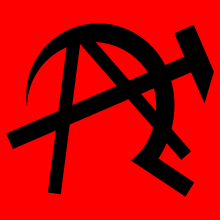List of political ideologies

This article may contain unverified or indiscriminate information in embedded lists. (December 2023) |
| Part of the Politics series |
| Party politics |
|---|
| |
| Part of the Politics series |
| Basic forms of government |
|---|
| List of countries by system of government |
| |
| Part of a series on |
| Economic systems |
|---|
| Major types |
In political science, a political ideology is a certain set of ethical ideals, principles, doctrines, myths or symbols of a social movement, institution, class or large group that explains how society should work and offers some political and cultural blueprint for a certain social order. A political ideology largely concerns itself with how to allocate power and to what ends it should be used. Some political parties follow a certain ideology very closely while others may take broad inspiration from a group of related ideologies without specifically embracing any one of them. An ideology's popularity is partly due to the influence of moral entrepreneurs, who sometimes act in their own interests. Political ideologies have two dimensions: (1) goals: how society should be organized; and (2) methods: the most appropriate way to achieve this goal.
An ideology is a collection of ideas. Typically, each ideology contains certain ideas on what it considers to be the best form of government (e.g. autocracy or democracy) and the best economic system (e.g. capitalism or socialism). The same word is sometimes used to identify both an ideology and one of its main ideas. For instance, socialism may refer to an economic system, or it may refer to an ideology that supports that economic system. The same term may also refer to multiple ideologies, which is why political scientists try to find consensus definitions for these terms. For example, while the terms have been conflated at times, communism has come in common parlance and in academics to refer to Soviet-type regimes and Marxist–Leninist ideologies, whereas socialism has come to refer to a wider range of differing ideologies which are most often distinct from Marxism–Leninism.[1]
Political ideology is a term fraught with problems, having been called "the most elusive concept in the whole of social science".[2] While ideologies tend to identify themselves by their position on the political spectrum (such as the left, the centre or the right), they can be distinguished from political strategies (e.g. populism as it is commonly defined) and from single issues around which a party may be built (e.g. civil libertarianism and support or opposition to European integration), although either of these may or may not be central to a particular ideology. Several studies show that political ideology is heritable within families.[3][4][5][6][7]
The following list is strictly alphabetical and attempts to divide the ideologies found in practical political life into several groups, with each group containing ideologies that are related to each other. The headers refer to the names of the best-known ideologies in each group. The names of the headers do not necessarily imply some hierarchical order or that one ideology evolved out of the other. Instead, they are merely noting that the ideologies in question are practically, historically, and ideologically related to each other. As such, one ideology can belong to several groups and there is sometimes considerable overlap between related ideologies. The meaning of a political label can also differ between countries and political parties often subscribe to a combination of ideologies.
Anarchism
[edit]| Part of a series on |
| Anarchism |
|---|
 |

- Political internationals
- Anarkismo (platformism and specifism)
- Informal Anarchist Federation (insurrectionary anarchism)
- International of Anarchist Federations (synthesis anarchism)
- International Confederation of Labor (anarcho-syndicalism and revolutionary syndicalism)
- International Workers' Association (anarcho-syndicalism)
Classical
[edit]Post-classical
[edit]Contemporary
[edit]Opposition
[edit]Religious variants
[edit]Regional variants
[edit]African
[edit]American
[edit]Asian
[edit]European
[edit]Oceanian
[edit]Authoritarianism
[edit]General
[edit]Other
[edit]Opposition
[edit]Religious variants
[edit]Regional variants
[edit]African
[edit]American
[edit]Asian
[edit]European
[edit]Communitarianism
[edit]| Part of the Politics series on |
| Communitarianism |
|---|
 |
| Politics portal |
General
[edit]Other
[edit]Regional variants
[edit]Communism
[edit]| Part of a series on |
| Communism |
|---|
 |
| |

- Political internationals
- Committee for a Workers' International (Trotskyism)
- Coordinating Committee for the Refoundation of the Fourth International (Trotskyism)
- Fourth International (Trotskyism)
- Fourth International (post-reunification) (Trotskyism)
- Fourth International Posadist (Trotskyism)
- International Bolshevik Tendency (Trotskyism)
- International Committee of the Fourth International (Trotskyism)
- International Communist Current (left communism)
- International Communist League (Fourth Internationalist) (Trotskyism)
- International Communist Party (left communism)
- International Conference of Marxist–Leninist Parties and Organizations (International Newsletter) (Maoism)
- International Conference of Marxist–Leninist Parties and Organizations (Unity & Struggle) (Hoxhaism)
- International Coordination of Revolutionary Parties and Organizations (anti-revisionism)
- International League of Peoples' Struggle (Marxism–Leninism–Maoism)
- International Meeting of Communist and Workers Parties (Marxism–Leninism)
- International Socialist Alternative (Trotskyism)
- International Socialist Tendency (unorthodox Trotskyism)
- International Workers League – Fourth International (Trotskyism)
- Internationalist Communist Union (Trotskyism)
- League for the Fifth International (Trotskyism)
- League for the Fourth International (Trotskyism)
- Trotskyist Fraction – Fourth International (Trotskyism)
- World Socialist Movement (anti-Leninism, classical Marxism, impossibilism and international socialism)
- Workers International to Rebuild the Fourth International (Trotskyism)
Authoritarian
[edit]| Part of a series on |
| Marxism–Leninism |
|---|
 |
Leninism
[edit]Marxism–Leninism
[edit]- Brezhnevism
- Castroism
- Ceaușism
- Dubčekism
- Gorbachevism
- Guevarism
- Ho Chi Minh Thought
- Hoxhaism
- Husakism
- Juche
- Kadarism
- Khrushchevism
- Maoism
- Marxist–Leninist atheism
- Scientific communism
- Stalinism
- Titoism
Libertarian
[edit]| Part of a series on |
| Anarchist communism |
|---|
 |

Marxism
[edit]Other
[edit]Opposition
[edit]Religious variants
[edit]Regional variants
[edit]African
[edit]American
[edit]Asian
[edit]European
[edit]- Albania
- Bosnia, and Herzegovina
- Bulgaria
- Belarus
- Croatia
- Cyprus
- Czechoslovakia
- Estonia
- Finland
- France
- Germany
- Greece
- Hungary
- Italy
- Latvia
- Lithuania
- Macedonia
- Moldova
- Montenegro
- Poland
- Portugal
- Romania
- Russia
- Serbia
- Slovenia
- Spain
- Ukraine
- United Kingdom
- Yugoslavia
Oceanian
[edit]Conservatism
[edit]| Part of a series on |
| Conservatism |
|---|
 |
- Political internationals
- International Democrat Union (conservatism)
- International Monarchist League (monarchism)
General
[edit]- Anti-unionism
- Authoritarian conservatism
- Bioconservatism
- Black conservatism
- Civic conservatism
- Classical conservatism
- Conservative corporatism
- Conservative liberalism
- Cultural conservatism
- Fiscal conservatism
- Green conservatism
- LGBT conservatism
- Liberal conservatism
- Libertarian conservatism
- National conservatism
- Neoconservatism
- Paleoconservatism
- Paternalistic conservatism
- Right-wing populism
- Social conservatism
- Social Darwinism
- Theoconservatism
- Traditionalist conservatism
Reactionary
[edit]Opposition
[edit]Religious variants
[edit]Regional variants
[edit]African
[edit]American
[edit]| This article is part of a series on |
| Conservatism in Canada |
|---|
 |
| This article is part of a series on |
| Conservatism in the United States |
|---|
 |
United States
[edit]Asian
[edit]European
[edit]| Part of the Politics series on |
| Toryism |
|---|
 |
Oceanian
[edit]| This article is part of a series on |
| Conservatism in Australia |
|---|
 |